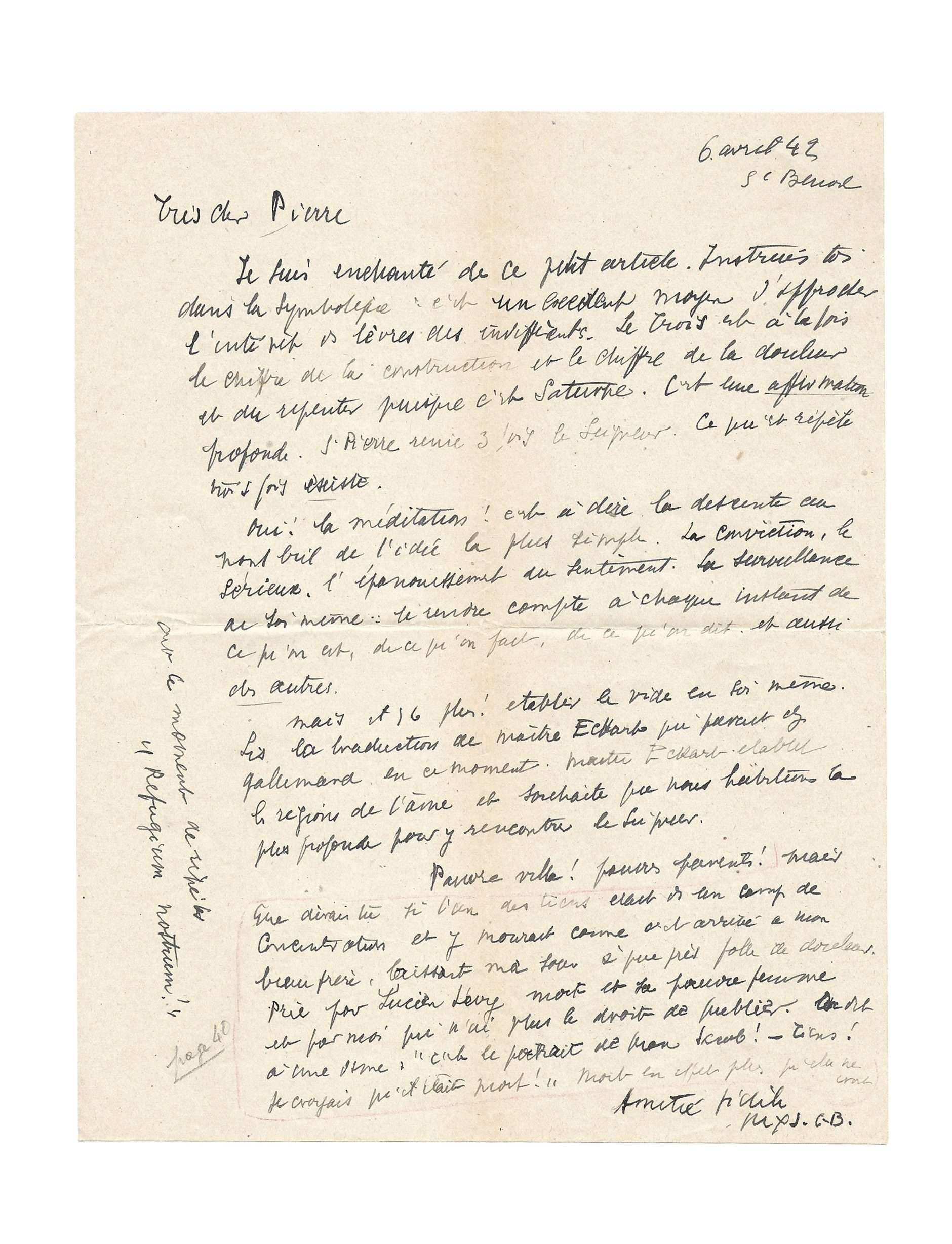JACOB, Max (1876-1944)
Autograph letter signed « Max Jacob » to Pierre Lagarde
St Benoît sur Loire, 6th April 1942, 1 p. in-4°
« What would you say if one of your own was in a concentration camp and died there… »
Fact sheet
JACOB, Max (1876-1944)
Autograph letter signed « Max Jacob » to Pierre Lagarde
St Benoît sur Loire, 6th April 1942, 1 p. in-4°
Typographical annotations, central fold
A partly unpublished letter on his faith and an allusion to the “Rafle des notables”, which had occurred five months earlier
« Très cher Pierre
Je suis enchanté de ce petit article. Instruis-toi dans la symbolique : c’est un excellent moyen d’approcher l’intérêt des lèvres des indifférents […] Oui ! la médiation ! c’est-à-dire la descente au nombril de l’idée la plus simple. La conviction, le sérieux, l’épanouissement du sentiment. La surveillance de soi-même : se rendre compte à chaque instant de ce qu’on est, de ce qu’on fait, de ce qu’on dit et aussi des autres […] établir le vide en soi-même. Lis la traduction de maître Eckhart qui parait chez Gallimard en ce moment. Maitre Eckhart établit les régions de l’âme et souhaite que nous habitions la plus profonde pour y rencontrer le supérieur.
Pauvre ville ! [Paris] pauvres parents ! Mais que dirais-tu si l’un des tiens était dans un camp de concentration et y mourait comme c’est arrivé à mon beau-frère, laissant ma sœur [Julie-Delphine] à peu près folle de douleur. Prie pour Lucien Lévy mort et sa pauvre femme et pour moi qui n’ai plus le droit de publier. On dit à une dame : ‘C’est le portrait de Max Jacob ! Tiens ! Je croyais qu’il était mort !’ Mort en effet plus qu’elle ne croit.
Amitié fidèle
Max Jacob »
The poet is alluding here to the third anti-Jewish roundup, known as the “roundup of notables”, carried out on December 12, 1941 by the French police. A total of seven hundred and forty-three citizens were arrested, including René Blum and the jeweler Lucien Lévy, Max Jacob’s brother-in-law. At the beginning of 1942, Max Jacob hid for a month in Orléans with the Tixiers, the in-laws of his painter friend and communist sympathizer Roger Toulouse. On March 8, 1942, Lucien Lévy died at the Royallieu camp in Compiègne, from which the first deportees who had survived their appalling internment until then would leave. A month after this letter, Max Jacob attended the funeral in Quimper of his elder sister Julie-Delphine, who had tuberculosis and was killed by grief on 15 April.
His poetic and mediational works, partly taken up by Pierre Lagarde in his admirable work Max Jacob – Mystique et martyr, are close to the quietist current. From then on, he assumed his life as a fisherman as a condition for his redemption. His Jewish origins led to his arrest by the Gestapo six months before the liberation of Paris, a fate he accepted as a martyr. He was interned by the French gendarmerie in the Drancy camp and died there five days later, a few hours before his scheduled deportation to Auschwitz.
Provenance:
Archives Pierre Lagarde
Sotheby’s Londres, 29 Nov. 1985, n° 328
Collection particulière, The Alphabet of Genius – Christie’s, 14 déc. 2023, n°109
Bibliography:
Max Jacob – Mystique et martyr, éd. Pierre Lagarde, La Baudinière, 1944, p. 40
Pierre Lagarde précise dans une notule en référence à la transcription partielle de cette lettre : ‘Il m’écrivait quelques temps plus tard’ : « J’ai, après mon beau-frère, perdu une sœur, morte sans maladie mortelle mais de chagrin. Très seul ! sauf mes amis et la consolation divine. »
